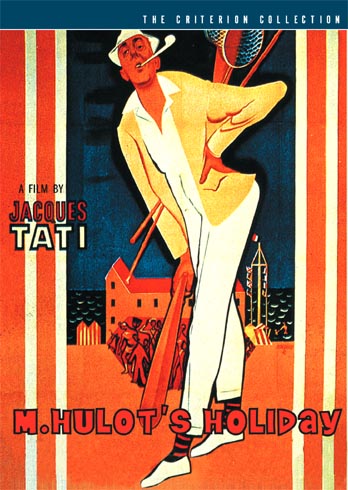The Film: M. Hulot's Holiday (110)
The Director: Jacque's Tati (Mon Oncle (111), Playtime (112))
What Is It: The first of three Jacque Tati, semi-surreal, almost-entirely-silent films starring Tati's character M. Hulot. Bumbling, and surprisingly charming, M. Hulot journeys to a seaside vacation town and, well, generally causes trouble.
A Lil' Bit of History: M. Hulot's Holiday (110) was Jacque Tati's first dance with this renowned bumbler. Tati played the character in the four films he made over the course of his career, each one a monstrous hit. As Roger Ebert writes, "There was a time when any art theater could do a week's good business just by booking Hulot.''
The Expectation: I was on a high coming out of my surprising enjoyment of The Scarlet Empress (109) and as a burgeoning film snob I'm required to be excited about any French film from 1980 or before. Thus, I was keener than keen.
The Experience: Life really took a front seat for a while here at the old Criterion Quest. Hulot and his wonderful holida were always present, always lingering in the back of mind, but it took weeks and weeks of self-motivation to finally sit down and swirl my toes in this beach-side comedy.
Strangely enough, whilst watching M. Hulot's Holiday (110) I found myself thinking about The Marx Brother's famous Duck Soup and the differences between the films and how they seem to unintentionally observe the very opposing traits of the two origin countries. Duck Soup is an assault on the senses, a machine-gun rattle of jokes, insults and near-psychotic bouts of hilarious violence that leave you dry-mouthed and confused. M. Hulot's Holiday (110) is, quite literally, a trip to the beach, a slowly-paced, saunter through a stylish world of France's bourgeoisie, interjected with dalliances of surreal humor that are appreciated but not necessarily gut-laughs. Where Grouch and company are borderline obnoxious (in the most gratifying of ways), M. Hulot is a lovable dope, a silently spinning vortex of distraction that unknowing pulls all within striking distance in.
Both films play with the notion of the ruling class, the government, the need for change. Duck Soup puts us at the forefront of the action. Rufus T. Firefly is, quite quickly, the ruler of a country, and all of his actions are direct satires of the fumbling American government. In M. Hulot's Holiday (110) we're given a look at the upper classes strict routines - the dinner bell, the beachside walks, the tightly-assed annoyance of those disturbed - and M. Hulot is a quiet bull in the China shop. He's not trying to break anything, but his mere presence is enough to, quietly, turn these routines on their head. He's a distraction - in tennis, in the dining hall, on the beach - that forces bridge-playing upper class to stop what they're doing and turn around. In the final moments of the film as M. Hulot and Martine (Nathalie Pascaud) dance, alone in the dining room, every one is watching. Jealous? Maybe, but certainly aware that something else exists outside of their small little bubbles.
And here's where the difference between America and France sticks out the most. The big, bold presence of the Marx's brother was how America wanted to be seen. A sizable presence that "walked tall and carried a big stick." And sure, Duck Soup pokes fun at the idea, but at the same time it embodies the in-your-face stylings of American comedy. It's gaudy and broad and absolutely hilarious. In comparison, in general, M. Hulot's Holiday (110) is stylized and sweet, a warm breeze off the ocean, that you smile at each and every time it rustles your hair. I know little about France, but from stereotypes alone, I imagine that this sort of quiet humor embodies much of the Frenchie's way of thought. Poke fun, but do so politely.
---
Criterion Counsel: Mon Oncle (111) is Tati's second attempt (in color) and it features a Jetson's like house of the future. Hulot and hilarious modernity? I'm in.


No comments:
Post a Comment